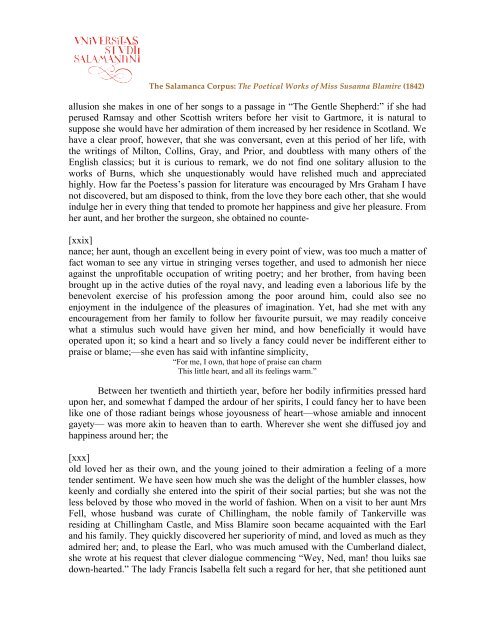The Poetical Works of Miss Susanna Blamire (1842) - Gredos ...
The Poetical Works of Miss Susanna Blamire (1842) - Gredos ...
The Poetical Works of Miss Susanna Blamire (1842) - Gredos ...
You also want an ePaper? Increase the reach of your titles
YUMPU automatically turns print PDFs into web optimized ePapers that Google loves.
<strong>The</strong> Salamanca Corpus: <strong>The</strong> <strong>Poetical</strong> <strong>Works</strong> <strong>of</strong> <strong>Miss</strong> <strong>Susanna</strong> <strong>Blamire</strong> (<strong>1842</strong>)<br />
allusion she makes in one <strong>of</strong> her songs to a passage in “<strong>The</strong> Gentle Shepherd:” if she had<br />
perused Ramsay and other Scottish writers before her visit to Gartmore, it is natural to<br />
suppose she would have her admiration <strong>of</strong> them increased by her residence in Scotland. We<br />
have a clear pro<strong>of</strong>, however, that she was conversant, even at this period <strong>of</strong> her life, with<br />
the writings <strong>of</strong> Milton, Collins, Gray, and Prior, and doubtless with many others <strong>of</strong> the<br />
English classics; but it is curious to remark, we do not find one solitary allusion to the<br />
works <strong>of</strong> Burns, which she unquestionably would have relished much and appreciated<br />
highly. How far the Poetess’s passion for literature was encouraged by Mrs Graham I have<br />
not discovered, but am disposed to think, from the love they bore each other, that she would<br />
indulge her in every thing that tended to promote her happiness and give her pleasure. From<br />
her aunt, and her brother the surgeon, she obtained no counte-<br />
[xxix]<br />
nance; her aunt, though an excellent being in every point <strong>of</strong> view, was too much a matter <strong>of</strong><br />
fact woman to see any virtue in stringing verses together, and used to admonish her niece<br />
against the unpr<strong>of</strong>itable occupation <strong>of</strong> writing poetry; and her brother, from having been<br />
brought up in the active duties <strong>of</strong> the royal navy, and leading even a laborious life by the<br />
benevolent exercise <strong>of</strong> his pr<strong>of</strong>ession among the poor around him, could also see no<br />
enjoyment in the indulgence <strong>of</strong> the pleasures <strong>of</strong> imagination. Yet, had she met with any<br />
encouragement from her family to follow her favourite pursuit, we may readily conceive<br />
what a stimulus such would have given her mind, and how beneficially it would have<br />
operated upon it; so kind a heart and so lively a fancy could never be indifferent either to<br />
praise or blame;—she even has said with infantine simplicity,<br />
“For me, I own, that hope <strong>of</strong> praise can charm<br />
This little heart, and all its feelings warm.”<br />
Between her twentieth and thirtieth year, before her bodily infirmities pressed hard<br />
upon her, and somewhat f damped the ardour <strong>of</strong> her spirits, I could fancy her to have been<br />
like one <strong>of</strong> those radiant beings whose joyousness <strong>of</strong> heart—whose amiable and innocent<br />
gayety— was more akin to heaven than to earth. Wherever she went she diffused joy and<br />
happiness around her; the<br />
[xxx]<br />
old loved her as their own, and the young joined to their admiration a feeling <strong>of</strong> a more<br />
tender sentiment. We have seen how much she was the delight <strong>of</strong> the humbler classes, how<br />
keenly and cordially she entered into the spirit <strong>of</strong> their social parties; but she was not the<br />
less beloved by those who moved in the world <strong>of</strong> fashion. When on a visit to her aunt Mrs<br />
Fell, whose husband was curate <strong>of</strong> Chillingham, the noble family <strong>of</strong> Tankerville was<br />
residing at Chillingham Castle, and <strong>Miss</strong> <strong>Blamire</strong> soon became acquainted with the Earl<br />
and his family. <strong>The</strong>y quickly discovered her superiority <strong>of</strong> mind, and loved as much as they<br />
admired her; and, to please the Earl, who was much amused with the Cumberland dialect,<br />
she wrote at his request that clever dialogue commencing “Wey, Ned, man! thou luiks sae<br />
down-hearted.” <strong>The</strong> lady Francis Isabella felt such a regard for her, that she petitioned aunt
















